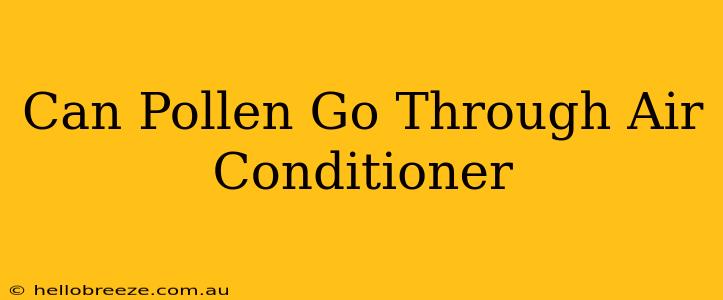Spring has sprung, and with it comes the dreaded pollen season. For allergy sufferers, the seemingly simple act of turning on the air conditioner offers a beacon of hope: relief from itchy eyes, sneezing fits, and stuffy noses. But does your AC truly offer the protection you need? The short answer is: not completely. While your air conditioner can significantly reduce the amount of pollen entering your home, it's not a foolproof barrier. Let's delve deeper into how pollen interacts with your AC system.
How Air Conditioners Filter Pollen
Air conditioners work by drawing in outside air, cooling it, and then circulating it throughout your home. Most modern AC units include filters designed to trap airborne particles, including pollen. These filters vary in effectiveness, depending on their MERV rating (Minimum Efficiency Reporting Value). A higher MERV rating indicates a greater capacity to capture smaller particles, including finer pollen grains.
Understanding MERV Ratings
- Lower MERV ratings (1-8): These filters primarily capture larger particles like dust and pet dander, offering limited protection against pollen.
- Mid-range MERV ratings (9-12): These filters are more effective at capturing smaller pollen particles, offering better protection for allergy sufferers.
- Higher MERV ratings (13-16): These high-efficiency filters capture even the smallest pollen particles, providing superior protection but potentially restricting airflow.
Factors Affecting Pollen Filtration
Even with a high-MERV filter, several factors can influence the effectiveness of your AC in keeping pollen out:
- Filter condition: A dirty or clogged filter restricts airflow and reduces its ability to trap pollen. Regularly changing your filter (according to manufacturer recommendations) is crucial. Consider upgrading to a higher MERV rated filter.
- Air leaks: If your home has significant air leaks around windows, doors, or other openings, pollen can easily bypass your AC system and enter your home. Sealing these leaks can greatly improve indoor air quality.
- AC type: Central air conditioning systems generally offer better pollen filtration than window units, due to their higher capacity and more efficient filtering systems.
- Pollen count: On days with extremely high pollen counts, even the most effective AC system might struggle to completely eliminate all pollen from your indoor air.
Beyond the Filter: Additional Tips for Allergy Relief
While upgrading your air filter and ensuring your AC unit is well-maintained are crucial steps, consider these additional strategies to minimize pollen exposure:
- Pre-filtering: Use a doormat to remove pollen from shoes before entering your home.
- Air purifiers: Consider using an air purifier with a HEPA filter in addition to your AC system for enhanced pollen removal.
- Regular cleaning: Frequent cleaning of your home helps to remove accumulated pollen.
- Clothing: Change your clothes after spending time outdoors to prevent pollen from transferring to your furniture and bedding.
Conclusion: Your Air Conditioner is a Helpful Ally, Not a Guarantee
Your air conditioner can significantly reduce the amount of pollen entering your home, particularly when coupled with a high-MERV filter and regular maintenance. However, it's not a foolproof solution. To maximize pollen protection, combine your AC system with other strategies like improving home sealing, using air purifiers, and adopting good cleaning habits. By taking a multi-pronged approach, you can create a more comfortable and healthier indoor environment, even during the peak of pollen season.

